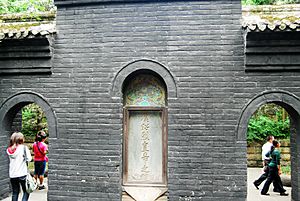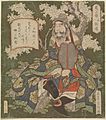Liu Bei facts for kids
Quick facts for kids Emperor Zhaolie of Han漢昭烈帝 |
|||||||||||||||||
|---|---|---|---|---|---|---|---|---|---|---|---|---|---|---|---|---|---|
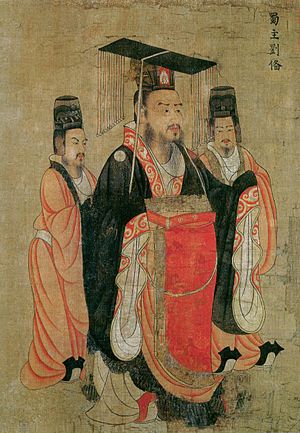
Tang dynasty portrait of Liu Bei by Yan Liben
|
|||||||||||||||||
| Emperor of Shu Han | |||||||||||||||||
| Reign | 15 May 221 – 10 June 223 | ||||||||||||||||
| Successor | Liu Shan | ||||||||||||||||
| King of Hanzhong (漢中王) (under the Han Empire) |
|||||||||||||||||
| Tenure | July or August 219 – 15 May 221 | ||||||||||||||||
| Born | 161 Zhuo County, Zhuo Commandery, Han Empire (present-day Zhuozhou, Baoding, Hebei) |
||||||||||||||||
| Died | 10 June 223 (aged 62) Baidicheng, Shu Han |
||||||||||||||||
| Burial | Hui Mausoleum, Chengdu, Sichuan | ||||||||||||||||
| Spouse |
|
||||||||||||||||
| Issue (among others) |
|
||||||||||||||||
|
|||||||||||||||||
| House | House of Liu (Shu Han) | ||||||||||||||||
| Father | Liu Hong | ||||||||||||||||
| Military career | |||||||||||||||||
| Allegiance | Han Empire Shu Han |
||||||||||||||||
| Battles/wars | Yellow Turban Rebellion Campaign against Dong Zhuo Invasion of Xu Province Battle of Xiapi Battle of Guandu Battle of Bowang Battle of Changban Battle of Red Cliffs Battle of Jiangling Invasion of Yi Province Territorial dispute in Jing Province Hanzhong Campaign Battle of Xiaoting |
||||||||||||||||
| Liu Bei | |||||||||||||||||||||||
|---|---|---|---|---|---|---|---|---|---|---|---|---|---|---|---|---|---|---|---|---|---|---|---|

"Liu Bei" in Traditional (top) and Simplified (bottom) Chinese characters
|
|||||||||||||||||||||||
| Traditional Chinese | 劉備 | ||||||||||||||||||||||
| Simplified Chinese | 刘备 | ||||||||||||||||||||||
|
|||||||||||||||||||||||
| Alternative Chinese name | |||||||||||||||||||||||
| Chinese | 玄德 | ||||||||||||||||||||||
| Literal meaning | (courtesy name) | ||||||||||||||||||||||
|
|||||||||||||||||||||||
Liu Bei (Chinese: 劉備, ; 161 – 10 June 223), also known as Xuande, was a powerful leader in ancient China. He lived during the end of the Han dynasty and helped start the state of Shu Han. He became its first emperor during the Three Kingdoms period.
Liu Bei was a distant relative of the Han imperial family. But his father died when he was young. This left his family very poor. To help his mother, he sold shoes and straw mats. When he was 15, his mother sent him to study with a famous teacher, Lu Zhi. Liu Bei was known for being ambitious and friendly. He gathered a group of fighters to battle the Yellow Turbans. He became famous for his bravery in many battles. Later, he joined a group against Dong Zhuo. He also fought with his childhood friend Gongsun Zan against Yuan Shao.
Liu Bei later helped Tao Qian against Cao Cao. With support from important families and Tao Qian's wish, Liu Bei took over Xu Province. After a defeat by Cao Cao, Lü Bu joined him. But Lü Bu took Xu Province when Liu Bei was away fighting Yuan Shu. Liu Bei then joined Cao Cao. They defeated Lü Bu at the Battle of Xiapi. Liu Bei was treated well by Cao Cao. But he got a secret order from the emperor to kill Cao Cao. So, he rebelled and took back Xu Province. After a short time with Yuan Shao, Liu Bei was defeated by Cao Cao. He had to join Yuan Shao. Yuan Shao sent him to cause trouble behind Cao Cao's lines. Later, Liu Bei joined his relative Liu Biao. Liu Biao treated him well. But he worried about Liu Bei's loyalty. So he sent Liu Bei to Xinye to protect against Cao Cao. Some records say Liu Biao wanted Liu Bei to take over his province. But Liu Bei refused. After Liu Biao died, Liu Bei and his followers joined Liu Qi. They allied with Sun Quan and fought Cao Cao at the Battle of Red Cliffs.
After Cao Cao's defeat, Liu Bei quickly took most of Jing Province. He married Sun Quan's sister. Sun Quan then let Liu Bei control Jing Province. He also "lent" him Nan Commandery. Liu Bei later helped another relative, Liu Zhang, in his war against Zhang Lu. But Liu Bei's advisors told him to betray Liu Zhang. So, Liu Bei seized Yi Province from him. After some fights with Sun Quan, Liu Bei agreed to give half of Jing Province to Sun Quan. He then led his army against Xiahou Yuan at Hanzhong and won. Liu Bei then called himself "King of Hanzhong." He set up his main base in Chengdu. But soon after, his general Guan Yu was killed by Sun Quan. Sun Quan also took the rest of Jing Province. Liu Bei was very angry. He declared himself emperor to challenge Cao Pi's power. He led his army against his former ally. He had some early wins. But his army was stopped by Sun Quan's general Lu Xun. Liu Bei was then defeated. He was ashamed and never went back to Chengdu. He stayed in Baidicheng until he died a year later. He told his son, Liu Shan, to be good and virtuous. Before he died, Liu Bei asked Zhuge Liang to advise his son on home matters. He asked Li Yan to advise him on military matters.
Liu Bei faced many challenges. He did not have much money or high social status like his rivals. But he gained support from people loyal to the Han dynasty. They did not like Cao Cao, who controlled the Han government and the emperor. Liu Bei led a movement to bring back the Han dynasty. He overcame many problems to create his own kingdom. At its largest, his kingdom included parts of modern-day Sichuan, Chongqing, Guizhou, Hunan, Hubei, and Gansu.
In popular culture, especially from the novel Romance of the Three Kingdoms, Liu Bei is seen as a kind and caring ruler. He looked after his people and chose good advisors. The novel shows him as a leader who followed Confucian values like loyalty and kindness. Historically, Liu Bei was also influenced by Laozi. He was a smart politician and leader. He was known for being "Confucian in appearance but Legalist in substance." This means he seemed kind and fair but used strict rules to govern.
Contents
Who was Liu Bei?
Liu Bei was a warlord who became the first emperor of the Shu Han state. He lived during a time of great change in China.
Liu Bei's Appearance
Historical texts describe Liu Bei as a tall man, about 1.74 meters (5 feet 8 inches) tall. He had long arms that reached past his knees. His ears were so large that he could see them. People sometimes called him "Big Ears."
Liu Bei's Family and Early Life
Liu Bei was born in Zhuo County, in what is now Hebei province. He was a descendant of a Han dynasty prince. But his family was not wealthy. His grandfather and father worked in local government. But Liu Bei's father died when Liu Bei was a child. This left his family poor. Liu Bei and his mother sold shoes and straw mats to make a living.
Even though he was poor, Liu Bei was very ambitious. Near his house, there was a very tall mulberry tree. Its shade looked like a small cart. People thought this tree meant someone noble would come from that house. A fortune teller even said, "This family will surely produce an important man." When Liu Bei was a child, he played under the tree. He often said, "I must ride in this emperor's chariot!" His uncle thought this dream was silly.
When Liu Bei was 14, his mother sent him to study with Lu Zhi. Lu Zhi was a respected scholar from Liu Bei's home area. One of Liu Bei's classmates was Gongsun Zan, who became his friend. Liu Bei treated Gongsun Zan like an older brother. Another classmate was his relative, Liu Deran. Liu Deran's father, Yuanqi, often helped Liu Bei and his mother with money. He treated Liu Bei like his own son. Yuanqi's wife did not like this. But Yuanqi said, "This boy is in our family, and he is an amazing person."
Young Liu Bei was not very interested in studying. But he loved dogs and horses. He also liked hunting, music, and wearing nice clothes. He enjoyed spending time with brave people. He was always calm and friendly. Liu Bei was very charismatic. All the brave young people liked him.
Around this time, two rich horse merchants, Zhang Shiping and Su Shuang, met Liu Bei. They were impressed by him. They gave him a lot of money. With their help, Liu Bei gathered many followers.
Liu Bei's Rise to Power
Fighting the Yellow Turban Rebellion
In 184, a big rebellion called the Yellow Turban Rebellion started. Liu Bei saw this and decided to act. He formed a group of fighters to help the government stop the rebels. He gathered loyal followers, including Guan Yu, Zhang Fei, and Jian Yong.
Liu Bei and his group joined government forces. They fought bravely against the rebels. Liu Bei became known for his courage. Once, he was badly hurt in a battle. He pretended to be dead to escape. A friend then took him away in a cart. Because of his help, the government made Liu Bei the Prefect of Anxi County.
Later, the government decided to remove officials who got their jobs for military help. An inspector came to Liu Bei's area. Liu Bei thought he might be dismissed. He tried to meet the inspector, but the inspector refused. Liu Bei was very angry. He went to the inspector's station with his men. He forced his way in. He tied up the inspector and took him outside. He hit him many times. Liu Bei wanted to kill him, but the inspector begged for mercy. So, Liu Bei let him go and left his job.
He then went south to join another group of fighters. He helped fight Yellow Turban rebels in Xu Province. He fought well and was rewarded again. He became the Prefect and Commandant of Gaotang County.
Joining Gongsun Zan
Liu Bei visited the capital city. Later, he returned to Pei and gathered more people. When the emperor died, China became chaotic. Liu Bei raised an army and joined the fight against Dong Zhuo. After this, he went back to Gaotang County. But rebels took over the area. So, he moved north to join his old friend, the warlord Gongsun Zan.
In 191, Gongsun Zan and Liu Bei won a big victory against Yuan Shao. Gongsun Zan made Liu Bei the Chancellor of Pingyuan State. He sent Liu Bei to help fight Yuan Shao's son, Yuan Tan. Liu Bei fought many battles well. He was made the Chancellor of Pingyuan.
While in Pingyuan, a local named Liu Ping disliked Liu Bei. He hired an assassin to kill him. But Liu Bei treated the assassin so kindly that the assassin could not do it. The assassin told Liu Bei about the plot and left. This shows how much Liu Bei won people's hearts. Pingyuan was poor, and people were starving. Liu Bei protected against bandits and helped the economy. He treated everyone, even common people, with respect. Many people joined him.
During this time, Kong Rong, a leader in Beihai State, was under attack by Yellow Turbans. He asked Liu Bei for help. Liu Bei said, "So, Kong Wenju knows there is a Liu Bei in this world?" He sent troops to help Kong Rong, and the attack was stopped.
Taking Over Xu Province
In 194, Yuan Shao's ally, Cao Cao, attacked Tao Qian, the Governor of Xu Province. Tao Qian asked Liu Bei for help. Liu Bei led over 5,000 soldiers to support Tao Qian.
Cao Cao had to retreat from Xu Province because one of his officers rebelled. Tao Qian asked Liu Bei to stay in Xiaopei. He gave Liu Bei more troops. Liu Bei then worked for Tao Qian. Tao Qian was a good leader and taught Liu Bei a lot. Liu Bei started to make connections with powerful families in the area. He gained the support of the Mi and Chen families.
Chen Deng, a talented man, respected Liu Bei. He said Liu Bei was a bold character and a future hero. Soon, Tao Qian became very ill. He told his helper, Mi Zhu, "Only Liu Bei can bring peace to this province." When Tao Qian died in 194, the Mi family supported Liu Bei to be the new Governor of Xu Province. Liu Bei was unsure about taking the job. He asked Kong Rong and Chen Deng for advice.
Chen Deng told him, "The Han dynasty is weak. This is your chance to do great things. This province is rich. We want you to lead it." Liu Bei thought Yuan Shu, a powerful warlord, should take it. But Chen Deng said Yuan Shu was too proud. He said, "I wish to gather 100,000 soldiers for you. You can help the emperor and the people. You can make a name for yourself." Kong Rong also told him to accept. He said, "If you do not take what heaven offers, you will regret it later." They also advised him to ally with Yuan Shao.
Liu Bei finally took over Xu Province after Yuan Shao agreed to his leadership.
Conflicts and Alliances
Fighting Lü Bu
In 195, Lü Bu was defeated by Cao Cao and found shelter with Liu Bei. The next year, Yuan Shu attacked Xu Province. Liu Bei led his troops to stop Yuan Shu. Around this time, Cao Cao made Liu Bei a general.
Liu Bei and Yuan Shu fought for about a month. Meanwhile, Zhang Fei, whom Liu Bei left in charge of Xiapi, killed Cao Bao after a fight. This caused trouble in Xiapi. Lü Bu used this chance to take control of Xiapi and capture Liu Bei's family.
Liu Bei rushed back, but most of his troops scattered. He went east to Guangling, where Yuan Shu's forces defeated him. Liu Bei then retreated to Haixi. Liu Bei's men were hungry and wanted to go back to Xiapi. Liu Bei had to surrender to Lü Bu. Lü Bu accepted and returned Liu Bei's family. He wanted Liu Bei to join him against Yuan Shu.
Lü Bu's commanders warned him that Liu Bei changed sides too often. But Lü Bu did not listen. Liu Bei was worried. He asked Lü Bu to move him to Xiaopei. Lü Bu agreed. Liu Bei quickly gathered 10,000 troops there.
Lü Bu worried about Liu Bei's growing power. He attacked Xiaopei first. Liu Bei was defeated and fled to Xuchang. There, he found shelter with Cao Cao, who controlled the emperor. Cao Cao welcomed Liu Bei. He made him Governor of Yu Province and gave him troops. Liu Bei returned to the front lines to watch Lü Bu.
In 197, Liu Bei defeated and killed Yang Feng, a bandit leader sent by Lü Bu. In 198, Lü Bu allied with Yuan Shu again. Lü Bu sent his men to buy horses, but Liu Bei captured their gold and money. Lü Bu sent Gao Shun and Zhang Liao to attack Liu Bei. Cao Cao sent Xiahou Dun to help, but Liu Bei was defeated again. His family was captured by Gao Shun and sent to Lü Bu. Liu Bei fled to Xuchang again. Cao Cao then led an army to attack Lü Bu in Xu Province. Later that year, Cao Cao and Liu Bei defeated Lü Bu at the Battle of Xiapi. Lü Bu was captured and executed.
Before Lü Bu was executed, he tried to convince Cao Cao to let him live. He said he would serve Cao Cao. But Liu Bei reminded Cao Cao how Lü Bu had betrayed others. Cao Cao agreed with Liu Bei. Lü Bu then glared at Liu Bei and called him "Big Ears."
Liu Bei got his family back and went with Cao Cao to Xu. Cao Cao promoted Liu Bei and treated him very well. They rode in the same chariot and sat on the same mat. Cao Cao's advisors told him to kill Liu Bei. But Cao Cao refused. He feared he would lose the respect of other heroes.
Liu Bei and Cao Cao's Rivalry
By 199, Cao Cao had a strong advantage. He controlled the emperor and the government. Liu Bei joined a secret plan to kill Cao Cao. The emperor had sent a secret message to kill Cao Cao. Around this time, Cao Cao told Liu Bei, "Only you and I are true heroes in the empire." Liu Bei was so shocked he dropped his chopsticks. He pretended it was due to thunder.
Liu Bei wanted to leave Xuchang and be free of Cao Cao. When he heard that Yuan Shu was going to join Yuan Shao, Liu Bei asked Cao Cao for permission to stop Yuan Shu. Cao Cao agreed. He sent Liu Bei and Zhu Ling to block Yuan Shu. Yuan Shu could not pass and died later that year. While Zhu Ling returned, Liu Bei stayed. He attacked and took control of Xu Province. He killed Che Zhou, the governor Cao Cao had appointed. Liu Bei then moved to Xiaopei. He left Guan Yu in charge of Xiapi.
Some stories say Liu Bei pretended to be a gardener to avoid Cao Cao's suspicion. He then secretly left Xuchang with his followers. He sealed up all the gifts he had received from Cao Cao and left them behind.
Many areas rebelled and joined Liu Bei against Cao Cao. Their forces grew to over 10,000 people. Meanwhile, Yuan Shao was preparing to attack Cao Cao. Liu Bei asked Yuan Shao to attack Cao Cao right away. But Yuan Shao refused. In 200, Cao Cao found out about the plot to kill him. He had everyone involved executed. Liu Bei survived because he was not in Xuchang.
Cao Cao then focused on fighting Yuan Shao. He sent his officers to attack Liu Bei in Xu Province. But they were defeated. Cao Cao then made a risky move. He left his defenses against Yuan Shao. He personally led an army to Xu Province to attack Liu Bei. Liu Bei's forces quickly fell apart. Xu Province fell to Cao Cao. Zhang Fei helped Liu Bei escape. Guan Yu was captured by Cao Cao and temporarily served him. Liu Bei went north to join Yuan Shao.
Liu Bei was welcomed by Yuan Shao's son, Yuan Tan. Yuan Shao himself traveled to greet Liu Bei. Liu Bei stayed for a while, and his soldiers regrouped. He fought with Yuan Shao's general, Wen Chou, against Cao Cao. But they were defeated, and Wen Chou was killed.
Liu Bei convinced Yuan Shao to lend him troops to help a rebel leader, Liu Pi, in Runan. Guan Yu also rejoined Liu Bei. Many people joined Liu Bei in Runan. Liu Bei and Liu Pi attacked Xuchang. But Cao Ren quickly defeated them. Liu Bei returned to Yuan Shao. He urged Yuan Shao to ally with Liu Biao, the Governor of Jing Province. Yuan Shao sent Liu Bei to help another rebel leader, Gong Du. Liu Bei and Gong Du defeated and killed Cai Yang, one of Cao Cao's officers.
Seeking Shelter with Liu Biao
In 201, Cao Cao attacked Liu Bei in Runan after defeating Yuan Shao. Liu Bei sent Mi Zhu and Sun Qian to Liu Biao. Liu Biao welcomed Liu Bei warmly. He gave him troops and sent him to Xinye County in northern Jing Province. This was to guard against Cao Cao. Many talented men joined Liu Bei. But Liu Biao did not fully trust Liu Bei.
In 202, Liu Biao ordered Liu Bei to fight Xiahou Dun and Yu Jin at Bowang. Liu Bei set a trap. He set fire to his own camp and pretended to retreat. When Xiahou Dun chased him, Liu Bei's hidden troops attacked them. Xiahou Dun's forces were crushed at the Battle of Bowang. Liu Bei stayed in Jing Province for about seven years. Once, he noticed his thighs had grown larger. He sighed and cried. He said that when he was younger, he always rode horses. Now, he did not ride as much, and his thighs had grown. He felt sad that time was passing, and he had not achieved his goals.
Liu Bei was once at Fancheng. Liu Biao was friendly but did not fully trust him. Some people wanted to kill Liu Bei at a banquet. Liu Bei realized this. He pretended to go to the toilet and escaped. His horse, Dilu, helped him escape by leaping across a stream. He then found a ferry and crossed the river. His pursuers caught up but could only apologize for Liu Biao.
In 207, Cao Cao planned to attack the Wuhuan in the north. He worried Liu Biao might attack his base. But Guo Jia assured him Liu Biao would not. Guo Jia was right. Liu Biao refused to attack Xu when Liu Bei suggested it. When Cao Cao returned, Liu Biao regretted not taking the chance. Liu Bei told him that opportunities would come again.
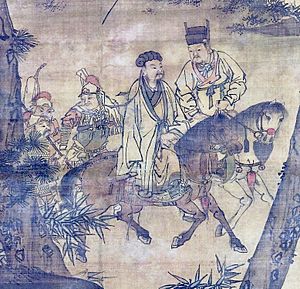
Jing Province was peaceful and attracted many scholars. Liu Bei asked Sima Hui, a respected recluse, about scholars. Sima Hui mentioned Zhuge Liang and Pang Tong as great talents. Xu Shu also told Liu Bei to visit Zhuge Liang. Liu Bei visited Zhuge Liang three times before finally meeting him. Zhuge Liang shared his Longzhong Plan. This plan outlined how to take over Jing Province and Yi Province. The goal was to attack the capital from two sides.
Liu Bei was very happy after meeting Zhuge Liang. He felt like a fish that had found water. He became very close to Zhuge Liang.
Some records say Liu Biao wanted Liu Bei to take over Jing Province when he was ill. But Liu Bei refused. He said Liu Biao's sons were wise. He did not want people to think he was seeking personal gain.
Liu Biao died in 208. His younger son, Liu Cong, took over. Liu Cong surrendered to Cao Cao without telling Liu Bei. When Liu Bei heard, Cao Cao's army was already close. Liu Bei was furious. He said Liu Cong had not been honest. Liu Bei pulled out his sword. But he decided not to kill the messenger. He gathered his officers. Some wanted to flee south. But Liu Bei said he could not betray Liu Biao's trust.
Liu Bei led his troops and many civilians south. They moved slowly, only about 10 li a day. Liu Bei sent Guan Yu ahead to Jiangling, where there were supplies and weapons. Some of Liu Bei's followers told him to move faster. They worried about Cao Cao's army. But Liu Bei said, "One must always consider people as fundamental. Now that people are joining me, how can I reject them!"
Cao Cao feared Liu Bei would reach Jiangling first. He led his cavalry in a fast pursuit. He covered over 300 li in a day and night. Cao Cao caught up with Liu Bei at the Battle of Changban. He captured most of Liu Bei's people and supplies. Liu Bei left his family behind and fled with only a few followers. He met Guan Yu's fleet and crossed the river to Xiakou. There, he met Liu Qi, Liu Biao's elder son. Over 10,000 followers joined them. Liu Qi did not want to surrender to Cao Cao. He kept Jiangxia Commandery and Xiakou. This allowed more of his father's former officers to escape. After this, Zhuge Liang told Liu Bei to form an alliance with Sun Quan.
Forming the Shu Kingdom
Alliance with Sun Quan
When Liu Bei was still at Dangyang, Lu Su met him. He suggested Liu Bei ally with Sun Quan against Cao Cao. Lu Su asked Liu Bei where he wanted to go next. Liu Bei said he wanted to join his friend Wu Ju. Lu Su told Liu Bei that Sun Quan was talented and kind. He said, "All the heroes from the south of the Yangtze river already joined him. He also holds six commanderies, his troops trained and the supplies abundant. You should join him." Liu Bei agreed with Lu Su.
Zhuge Liang went as Liu Bei's representative to meet Sun Quan. They discussed forming an alliance against Cao Cao. Sun Quan already knew of Liu Bei's good reputation. He was impressed by Zhuge Liang's words. So, Liu Bei and Sun Quan formed their first alliance.
Liu Bei led his army to Fankou. Cao Cao's army was getting close. Liu Bei was worried. He sent scouts daily to see if Sun Quan's army had arrived. When they did, Liu Bei sent a messenger to Zhou Yu, Sun Quan's general. Liu Bei joined Zhou Yu on a boat. He asked Zhou Yu about his plan to defeat Cao Cao. Zhou Yu said he had 30,000 troops, which Liu Bei felt was not enough. Zhou Yu insisted it would be enough. Liu Bei was unsure. He kept his forces separate from Zhou Yu's.
The two sides fought at the Battle of Red Cliffs. The Sun-Liu alliance won a big victory. Cao Cao retreated north. He left Cao Ren and Xu Huang to guard Jiangling.
After their victory, Zhou Yu gave some land to Liu Bei. Liu Bei set up his camp at Youjiangkou. Many of Liu Biao's officers who had been forced to join Cao Cao now joined Liu Bei. Liu Bei felt the land given to him was too small. He received more areas from Sun Quan.
Sun Quan's forces, led by Zhou Yu, attacked Cao Ren for Jiangling. Liu Bei suggested Liu Qi be the new Inspector of Jing Province. Liu Bei led his men to capture four commanderies in southern Jing Province. Lei Xu also joined Liu Bei with 10,000 soldiers. Liu Bei set up his base at Gong'an County and grew his forces.
When Liu Qi died in 209, Liu Bei became the new Inspector of Jing Province. To make the alliance stronger, Liu Bei married Sun Quan's younger sister, Lady Sun. Sun Quan then recognized Liu Bei's control over southern Jing Province. He also "lent" Nan Commandery to him.
Sun Quan wanted to conquer Yi Province with Liu Bei. But Liu Bei's officers thought Liu Bei should conquer it alone. Liu Bei told Sun Quan that Yi Province was strong and hard to conquer. He also worried about attacking an ally (Liu Zhang). He said Cao Cao would use that chance to attack them. Liu Bei refused to let Sun Quan's army pass through his territory to attack Yi Province. He said he would become a hermit if Sun Quan took Yi Province. Sun Quan understood Liu Bei's intentions and ordered his army to return.
More of Liu Biao's former officers joined Liu Bei. After Zhou Yu died in 210, Liu Bei's power in Jing Province grew. Lu Su took over as Sun Quan's commander. He moved his headquarters and gave Liu Bei control of most of Jing Province.
| Key Events in Liu Bei's Life | |
|---|---|
| 161 | Born in Zhuo County. |
| 184 | Fought in the Yellow Turban Rebellion. |
| 194 | Became Governor of Xu Province. |
| 198 | Defeated by Lü Bu. Allied with Cao Cao and won the Battle of Xiapi. |
| 200 | Defeated by Cao Cao. Joined Yuan Shao, then Liu Biao. |
| 208 | Allied with Sun Quan and won the Battle of Red Cliffs. Took over Jing Province. |
| 214 | Defeated Liu Zhang and took over Yi Province. |
| 219 | Conquered Hanzhong. Declared himself King of Hanzhong. |
| 221 | Proclaimed himself Emperor of Shu Han. |
| 222 | Lost the Battle of Xiaoting against Eastern Wu. |
| 223 | Died in Baidicheng. |
Conquering Yi Province
In 211, Liu Zhang, the Governor of Yi Province, heard that Cao Cao planned to attack Zhang Lu in Hanzhong. Hanzhong was important for protecting Yi Province. Liu Zhang was afraid. His advisor, Zhang Song, told him that Liu Bei was a strong rival to Cao Cao. He suggested using Liu Bei to defeat Zhang Lu. This would make Yi Province safe.
Liu Zhang sent Fa Zheng to form an alliance with Liu Bei. Zhang Song and Fa Zheng secretly disliked Liu Zhang's rule. They saw Liu Bei as a better leader. Liu Bei welcomed them warmly. He used this chance to learn about Yi Province's weapons, supplies, and important locations. Zhang Song and his group told him everything. They even drew a map of the province. Liu Bei learned all about Yi Province. Liu Zhang invited Liu Bei to join him in Yi Province to capture Hanzhong.
Liu Bei led a large force into Yi Province. He left Zhuge Liang, Guan Yu, Zhang Fei, and Zhao Yun to guard Jing Province. Liu Zhang welcomed Liu Bei. They were friendly. Liu Bei was given more troops. His army grew to over 30,000 men. Liu Bei went to Jiameng Pass, near Zhang Lu's territory. Instead of fighting Zhang Lu, Liu Bei stopped. He focused on building connections and gaining influence. He was kind and virtuous, and soon gained the support of the people.
In 212, Cao Cao attacked Sun Quan. Liu Bei sent a message to Liu Zhang. He said he needed to help Sun Quan. He asked for 10,000 more soldiers and supplies for Jing Province. Liu Zhang only gave him 4,000 troops and half the supplies. Liu Bei used this to motivate his troops. He said Liu Zhang was rich but did not reward his fighters enough.
Zhang Song's brother, Zhang Su, found out about Zhang Song's secret talks with Liu Bei. He told Liu Zhang. Liu Zhang was furious. He executed Zhang Song. He ordered his officers to stop Liu Bei's messages.
When Liu Bei found out, he was angry. Fa Zheng and Meng Da joined Liu Bei. Liu Bei tricked two of Liu Zhang's officers, Yang Huai and Gao Pei. He executed them and took their troops. Liu Bei then attacked Fu County.
In 213, Liu Zhang sent officers to stop Liu Bei. But they were defeated or captured. Many of Liu Zhang's trusted officers, like Wu Yi and Li Yan, surrendered to Liu Bei. Liu Bei's army grew stronger. He sent commanders like Zhuge Liang, Zhang Fei, and Zhao Yun to take over other areas. Only Guan Yu stayed in Jing Province.
Liu Zhang's son, Liu Xun, retreated to Luo County. The siege lasted almost a year. In 214, Luo County fell to Liu Bei. Liu Zhang held out in Chengdu. But Ma Chao, a former warlord, joined Liu Bei and attacked Chengdu. Liu Zhang surrendered to Liu Bei. He said he did not want more bloodshed. Liu Bei became the Governor of Yi Province. He moved Liu Zhang to Jing Province. Liu Bei held a big celebration. He gave gold and silver to his officers and grain to the people.
Liu Bei married Wu Yi's sister. He traveled around to strengthen his control of Yi Province. He gave Zhuge Liang control over all state affairs. He appointed Dong He as Zhuge Liang's helper. Fa Zheng became his strategist. Guan Yu, Zhang Fei, Ma Chao, and Huang Zhong became his main commanders. All his followers, old and new, received new responsibilities. Liu Zhang's followers were also given important jobs. Everyone wanted to get Liu Bei's attention.
Dispute with Sun Quan
After Liu Bei took Yi Province, Sun Quan asked for the return of the commanderies in Jing Province. But Liu Bei refused. He said to wait until he took Liang Province. Sun Quan was angry. He sent Lü Meng and Ling Tong with 20,000 men to attack southern Jing Province. They captured Changsha, Guiyang, and Lingling. Meanwhile, Lu Su and Gan Ning advanced to Yiyang. Liu Bei personally went to Gong'an with 50,000 soldiers. Guan Yu led 30,000 men to Yiyang. Just as war was about to start, Liu Bei heard that Cao Cao planned to attack Hanzhong.
Liu Bei worried about Cao Cao taking Hanzhong. He made a peace treaty with Sun Quan. Jiangxia, Changsha, and Guiyang went to Sun Quan. Nan Commandery, Lingling, and Wuling went back to Liu Bei. The new border was along the Xiang River. Liu Bei led his army back to Ba commandery. He sent troops to meet Zhang Lu. But Zhang Lu had already surrendered to Cao Cao.
Hanzhong Campaign
In 215, Cao Cao defeated Zhang Lu and took Hanzhong. Some of Cao Cao's advisors told him to attack Yi Province. They said Liu Bei's new government was still weak. But Cao Cao did not like the terrain. He left Xiahou Yuan, Zhang He, and Xu Huang to defend Hanzhong.
Zhang He tried to move people from Ba Commandery to Hanzhong. Liu Bei sent Zhang Fei to take over the Ba region. Zhang Fei and Zhang He fought for 50 days. Zhang Fei won after a surprise attack. Zhang He escaped, and the Ba region became part of Liu Bei's territory.
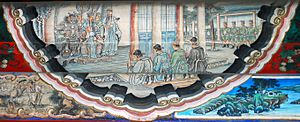
In 217, Fa Zheng told Liu Bei to take Hanzhong. Liu Bei sent Zhang Fei and Ma Chao to capture Wudu. Liu Bei led his main army to Yangping Pass. Zhang Fei's aides were defeated, and he had to retreat. Liu Bei fought Xiahou Yuan at Yangping Pass. He tried to cut off the enemy's supplies. But his general Chen Shi was defeated by Xu Huang. Liu Bei also attacked Zhang He but failed. The war became a stalemate. Cao Cao decided to gather an army in Chang'an to fight Liu Bei.
In spring 218, Liu Bei and Xiahou Yuan had been fighting for over a year. Liu Bei led his army south of the Mian River. He ordered Huang Zhong to set up camps on Mount Dingjun. From there, they could watch Xiahou Yuan's camp below. One night, Liu Bei sent 10,000 troops to attack Zhang He. He also set fire to Xiahou Yuan's defenses. Xiahou Yuan went to put out the fire. Fa Zheng saw a chance to attack. Liu Bei sent Huang Zhong to attack from above. Huang Zhong killed Xiahou Yuan and Zhao Yong.
Zhang He retreated. He waited for Cao Cao's help. Liu Bei knew Cao Cao would come. But he also knew he could hold Hanzhong. He secured all the important passes. Liu Bei faced Cao Cao for several months but avoided direct battle. This forced Cao Cao to retreat. Many of his soldiers deserted. Zhang He also retreated to set up defenses. Liu Bei led his main army to Nanzheng. He sent Meng Da and Liu Feng to capture Fangling and Shangyong.
In 219, after conquering Hanzhong, Liu Bei's followers urged him to declare himself a king. This would challenge Cao Cao, who was also a king. So, Liu Bei declared himself "King of Hanzhong." He set up his main base in Chengdu.
He named his son Liu Shan as his heir. Wei Yan was put in charge of Hanzhong. Xu Jing and Fa Zheng were given important government jobs. Guan Yu, Zhang Fei, Ma Chao, and Huang Zhong became his top generals.
Becoming Emperor
In late 219, Sun Quan's forces, led by Lü Meng, invaded Liu Bei's lands in Jing Province. They captured and executed Guan Yu. When Liu Bei heard about Guan Yu's death and the loss of Jing Province, he became furious. He ordered his troops to prepare for war with Sun Quan. In early 220, Cao Cao died. His son, Cao Pi, took over. Later that year, Cao Pi took the throne from the emperor. He ended the Han dynasty and started the state of Cao Wei. There were rumors that the Han Emperor had been killed. Liu Bei declared a period of mourning.
Many officials in Liu Bei's court wanted him to declare himself emperor. But Liu Bei refused at first.
Meng Da worried he would be punished for not sending help to Guan Yu. So, he joined Wei. Zhao Yun and others told Liu Bei to attack Cao Pi instead of Sun Quan. But Liu Bei did not listen. Meng Da suggested to Cao Pi to attack Liu Bei's areas. Liu Bei's adopted son, Liu Feng, fought bravely. But he was betrayed and defeated. When Liu Feng returned to Chengdu, Liu Bei was angry about his loss and his failure to help Guan Yu.
In 221, Liu Bei declared himself emperor. He started the state of Shu Han. He said he wanted to keep the Han dynasty alive. He made Zhuge Liang his chancellor. He established a government and a temple to honor the Han dynasty's first emperor. He made Lady Wu his empress. His son Liu Shan became the crown prince. He also named his other sons, Liu Yong and Liu Li, as princes.
Defeat and Death
In August 221, Liu Bei personally led an army to attack Sun Quan. He wanted to get revenge for Guan Yu and take back his lost lands. He left Zhuge Liang in charge of Chengdu. Sun Quan sent a letter asking for peace, but Liu Bei refused. Even though Zhang Fei was killed by his own men at the start of the battle, Liu Bei had some early wins. He defeated Sun Quan's commanders until Lu Xun, Sun Quan's general, ordered a retreat to Yiling. Lu Xun held his position and refused to fight.
Lu Xun knew Liu Bei was not expecting an attack. He ordered a counterattack. He set fire to Liu Bei's camps, which were linked by wooden fences. Forty of Liu Bei's camps were destroyed. The remaining troops were defeated. They fled west to Ma'an Hills. Lu Xun caught up and surrounded Liu Bei. Liu Bei managed to escape overnight to Baidicheng. He ordered his men to burn their armor to create a fire blockade. Lu Xun could not get past the fire. Later, because Cao Pi invaded Wu, Lu Xun and Liu Bei renewed their alliance.
A few weeks before the big battle, a strange yellow light appeared in the sky. Many saw it as a bad sign. After his defeat, Liu Bei said, "My defeat is Heaven's will!"
Liu Bei stayed in Baidicheng until he died from a serious illness on April 1, 223. Sun Quan heard Liu Bei was ill and sent an envoy for peace. Liu Bei accepted. A local official, Huang Yuan, rebelled when he heard Liu Bei was ill. He feared problems with Zhuge Liang after Liu Bei's death. But he was defeated and executed.
Liu Bei had lost many of his closest officials. He was ashamed of his defeat. He refused to return to his capital in Chengdu. On his deathbed, he named Zhuge Liang and Li Yan as guardians for his son, Liu Shan. He told his sons to live well and do what was right.
His body was brought back to Chengdu. He was buried four months later. Liu Bei was given the name Zhaolie after his death. Liu Shan became the new emperor of Shu Han. Zhuge Liang later made peace with Sun Quan. He rebuilt the alliance against Cao Pi.
Liu Bei in Popular Culture
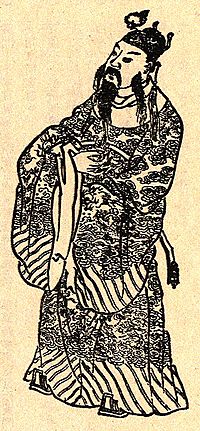
The novel Romance of the Three Kingdoms, written in the 14th century, tells a romanticized version of the Three Kingdoms period. It makes Liu Bei seem like a very kind and fair leader. He is shown as having great charisma. He built his state based on Confucian values. The novel also stresses that Liu Bei was related to the Han dynasty's royal family. This made his rule seem more rightful.
The novel adds more details to Liu Bei's appearance. It says he was tall, with ears so large they touched his shoulders. He had long arms that reached past his knees. He had a fair face and red lips. He used two double-edged swords.
Some famous stories about Liu Bei from the novel include:
- Oath of the Peach Garden: Where he, Guan Yu, and Zhang Fei became sworn brothers.
- Battle of Hulao Pass: A famous battle where he fought alongside his sworn brothers.
- Liu Bei § Notes: How he convinced Zhuge Liang to join him.
- Liu Bei § Notes: How his horse saved him from danger.
- Liu Bei § Notes: His political marriage to Sun Quan's sister.
Worship of Liu Bei
Liu Bei is honored as the patron saint of shoemakers in Chengdu. Chengdu is known as the "City of Shoes." In 1845, shoemakers in Chengdu, who called themselves "disciples of Liu Bei," built the Sanyi Temple in his honor. The temple has been moved many times. It is now in Wuhou District.
In recent years, the worship of Liu Bei among shoemakers has become popular again. In 2005, a large parade was held for Liu Bei. This was the first such event since 1949.
Some people say this worship is just a way to use Liu Bei's fame for business. They argue that Liu Bei sold shoes when he was young. But he did not invent shoes. Legend says Yu Ze made the first shoes. However, this criticism has not stopped shoe industry owners. They plan to build a statue of Liu Bei in the West China Shoe Center Industrial Zone.
Images for kids
-
Edo period illustration of Liu Bei
-
Edo period illustration of Liu Bei breaking the Siege of Beihai along with Taishi Ci, Guan Yu and Zhang Fei
-
Statue of Liu Bei in Zhuge Liang's temple in Chengdu
-
A mural showing chariots and cavalry, from the Dahuting Tomb of the late Eastern Han dynasty (25-220 CE), located in Zhengzhou, Henan
See also
 In Spanish: Liu Bei para niños
In Spanish: Liu Bei para niños
- Lists of people of the Three Kingdoms
- List of Chinese monarchs
 | Bayard Rustin |
 | Jeannette Carter |
 | Jeremiah A. Brown |


